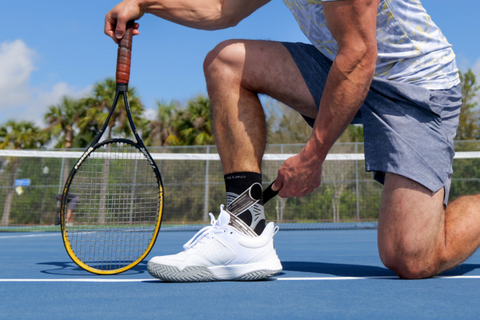How to Fix Pronated Ankles: Insoles & Treatment Options

How Do You Fix Pronation of the Ankles?
Pronated ankles are a result of overpronation, which happens when your feet and ankles roll too far inward as you walk or run. This puts extra pressure on the tendon in your inner ankle and on your heels, sometimes causing alignment problems, instability, and pain.
Along with exercises, doctor’s advice, and wearing the right shoes, a good way to treat ankle pronation is with PowerStep® orthotic insoles for overpronation. Keep reading for more information on what ankle pronation is and how you can fix pronated ankles with PowerStep orthotics.

What is ankle pronation?
Foot pronation is the normal movement of the foot and ankle rolling inward as you walk or run. This motion helps absorb shock and distribute weight evenly across the foot. When your feet and ankles roll too far inward, it is called overpronation, also known as ankle pronation.
You might notice that your ankle bones on the inside of your feet are more prominent or that your Achilles tendon behind your ankles curve inward instead of remaining straight. The bottom of your shoes might also show significant wear on the inner edges. Taking a wet test or arch height test can help you determine how your foot moves and what pronation insoles you need.

Is ankle pronation bad?
When the ankle and foot collapse inward, it puts excess strain on the muscles, tendons, and ligaments that support the arch. Without the proper support of an orthotic insole, your arch may overstretch or flatten, and your ankle and feet become misaligned, affecting your knees, hips, and back.
People with this common foot condition may experience arch pain or heel pain as well as back, knee or hip pain associated with misalignment. Ankle pronation is not always painful, but it can increase your chance of injury and result in other conditions, including:
- Posterior Tibial Tendon Dysfunction (PTTD)
- Plantar fasciitis
- Flatfeet
- Achilles tendinitis
- Chronic instability
- Gout or ankle stiffness
- Bunions
- Shin splints
Pain from ankle pronation can severely affect your quality of life, preventing you from enjoying your favorite activities. Running with flat feet, for example, can make you more susceptible to running injuries and reduce your athletic ability. Orthotics for overpronation help prevent overpronation and relieve pain by improving alignment, stability, and foot function.

The Best Insoles for Pronated Ankles
Pronation of the ankle does not always require medical treatment, but wearing an orthotic insole with firm support and plenty of cushioning can prevent future problems and relieve pain. Designed by a podiatrist, PowerStep orthotic insoles are the easiest and most effective way to treat pronation and overpronation. Here are the best insoles for overpronation:
- Pinnacle Low Insoles – A trusted solution to improve foot function, decrease arch pain, and help alleviate conditions caused by mild overpronation, our low arch insoles stabilize and align the feet to help prevent and relieve pain.
- Pinnacle Maxx Support Insoles – A corrective orthotic for moderate to severe overpronation, Pinnacle Maxx features firmer support and enhanced stability with an angled heel post that prevents the heel from rolling inward.
- PULSE Maxx Running Insoles – For those who need relief from running with flatfeet or overpronation, there’s PULSE Maxx, a corrective running orthotic that provides firmer support, greater stability, and improved shock absorption.
- Heat Moldable Insoles – Many overpronators require the individual support of a custom orthotic. Heat moldable insoles provide a personalized fit for all arch types at a lower cost than custom insoles for overpronation.

More Ankle Pronation Treatment Options
By pairing other treatment options with PowerStep orthotic insoles, you can have the best support possible for managing pronated ankles and relieving pain. Additional ways to treat ankle pronation include:
- Supportive shoes – Shoes with sturdy soles, arch support, and good stability keep your feet aligned while cushioning helps absorb shock to relieve pain. PowerStep orthotic footwear is designed to prevent and relieve pain from conditions caused by mild to moderate pronation.
- Bracing and support – Ankle braces help limit the rolling motion of the ankle to help manage chronic instability, ankle sprains, and unhealthy movement. The Dynamic Ankle Support Sock is the best ankle brace for pronation, providing enhanced support, alignment, and stability, especially for athletes recovering from sprains or injuries.
- Topical pain relief – Foot pain from overpronation or flatfeet can be relieved as needed using a topical pain reliever like Doctor Hoy’s Natural Pain Relief topicals.
- Physical therapy exercises – Daily foot stretches and exercises for overpronation help strengthen and stretch the muscles in the foot, ankle, and lower legs weakened by poor alignment. This may also help slightly raise the inner arch of the foot overtime.


Fix Foot & Ankle Pronation with PowerStep Orthotics
While pronation is a normal occurrence, overpronation of the ankle and foot can lead to a variety of foot problems including instability, chronic pain, and conditions like plantar fasciitis or flatfeet. PowerStep orthotic insoles encourage healthy alignment and improve foot function while absorbing shock to prevent and relieve problems caused by overpronation, making every step pain-free.
References:
Disease/Condition: Overpronation: What It Is, Causes & Treatment. (n.d.). Cleveland Clinic.



















